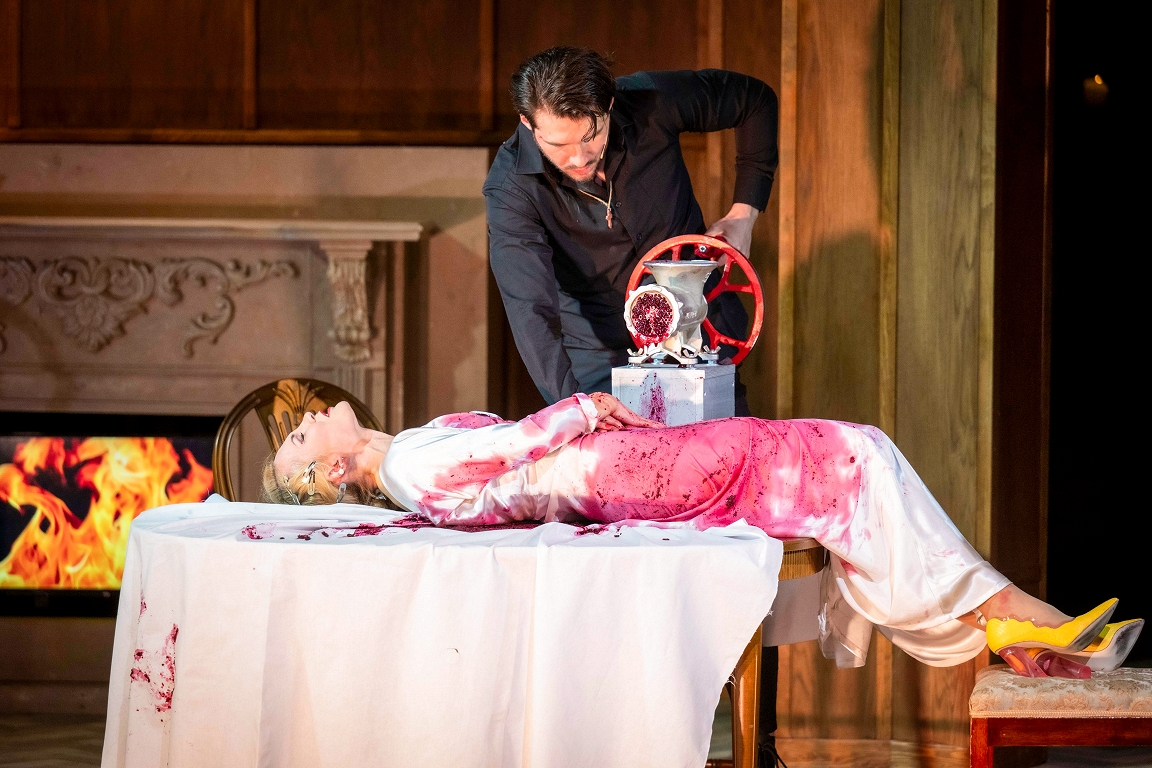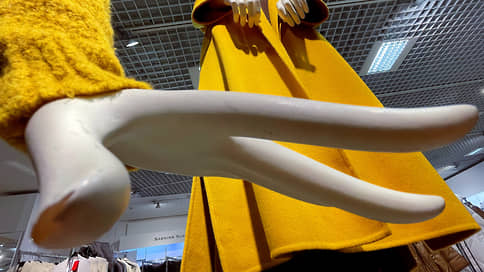Revolver at the temples. Mikhail Chekhov’s Riga Russian Theater Performance Cherry Garden Review / Day

When a bustling public demands the focus, Governante Charlotte Ivanovna, portrayed by Tatyana Lukashenkova, pulls out the revolver and arranges a Russian roulette session. When the shot goes open, it hit the ceiling, however, watching Viestur Kairish staged Anton Chekhova Cherry garden, does not leave the feeling that the director is constantly targeting Mikhail Chekhov in the Riga Russian Theater Hall. From the Czechs and lightly airy sadness in the air, there is no message here.
This is the case when the show must be evaluated in at least two different contexts. It is a typical line for the last season of Viestur Kairish to talk harshly about the war and the regime in Russia. And at the same time, it fits in, and yet differs from the modern solutions of classics, which in the political context of Russia have been created a few years ago by emigrants Dmitry Krimov and Yuri Butusov.
The banality of evil
Viesturs Kairišs seems to have defined the mission as much as the mission, but through classics to talk about Russia as an evil empire and condemn it and continued to continue the war in Ukraine. It would be pretty barren to try to pull together some diligions and/or trilogy but cannot ignore the fact that Cherry garden Continues at the Chekhov Theater in the Hamlet and the Daile Theater in 2023 this season’s scandal – Dream summer night – Principal lines. In both Shakespeare’s interpretations, the Russian theme came with different accents: in the first case, as a chronicle of peaks of power, in the second, as the internal peripetia of the occupant troops. In turn In a cherry gardenThe director positions as a study on the role and responsibility of Russian intelligence in today’s Russian disaster, used some techniques similar to those used in both of the above performances. The claustrophobic, hermetically sealed environment, which remotely enters the noises of the processes outside, is similar to Hamlet, while the dream has moved from an image of a severely mutilated and bleeding soldier who unexpectedly shocks the audience when they are not waiting for it.
There are many blood – direct and metaphorical in Viestur Kairish. In fact, red cherries as such have become a symbol of blood. Another thing is that the director’s manner is sometimes extremely direct, intrusive and even aggressive. When the Russian emigration actress living in Paris visually similar to Veronica Plotnikova’s white dress on the table with a mass of cherries ground in a meat grinder, associations with blood. When the characters in the finals flock to the catafal firs (clear Alusion with Lenin in the mausoleum) in vampiric greed, Alexander Malikov’s body sinks into red liquid.
The show is purposefully brutal and deliberately banal, as if I would like to illustrate Hannah Arent’s thesis on the banality of evil. Banal is the desire of Elina Bartkevich Duņash to get into life through any bed, banal is a show of heroes and a dull party, the banal is a sauna scene with muscular and tanned Firsu strings. And before despair, Banal is Shamil Hamatov Lopahin, a allergy -affected newly -affected newborner who can and wants to buy anything and anyone in the heart and mind, holding memories of his humble origin.
Values are different
Reaction by Viestura Kairisha Cherry garden has caused one part of the audience, resembles a frustrated ants, which the director has not plunged with a stick, but when forgiven for a metaphor. This part of the public is not homogeneous, and the reasons for not healing of Kairishi and at the same time Chekhov’s theater. Still – and not just in the Russian audience – there are enough spectators who, in principle, accept no attempt to modern classics, as if they had only one canon of production. This is the thinking of socialist realism in a sense, because it is not even about the type of game that was in a particular work, but rather the aesthetic at which the Soviet theater space to get used to the 70s and 80s of the 20th century. years (and here I am not talking about aesthetic searches that happened at that time).
The other group of accusations involves politicization of classics and theater as a whole. In other words, there is a part of the audience that mourning with Dmitry Krimov’s sad nostalgic shows Peter Penn. Syndrome and The notes of insanewith the tragic of exile, but the source of evil is not defined, but the same people become nervous if this source is named in the name. But the same Dmitry Krimov was created by Chekhova shortly before emigration in Moscow Gull Interpretation with the name Kosticwhich in one session on the big screen also showed in Riga, and this show is not so far from Viestur Kairisha after its intonation Cherry garden – To remember, even in the form of a camouflage, a scary, frighteningly brutal Chanson singer Arkadin. Director Yuri Butusov’s sharp social critic performance after Nicholas Gogola is also shown on the big screen in Riga Auditor motifs with a name Rand that – unlike Costa – Amazing still shows Moscow Theater Satyricon. Dmitry Krimov sees the ray of hope at least his performances in the title hair, Yuri Butusov has no one.
There is no positive hero for Viestur Kairish, even for a moment, the hope is that this might be an ana portrayed by Natalia Zhivec. Also in the exalted Veronica Plotnikova Ranevsk (which in itself is a masterful acting), there is no true emotions. However, the backlash has another aspect – unlike the two of the above, the well -known directories of Russia, Viesturs Kairišs is an off -time, even a rusophobe who defects the holiness of Russian culture, and thus the anatem falls over the theater led by Dan Bjorka, which still sounds like every big hall. Then the show begins, and it turns out that the values are different, and some of the audience leave the theater after the first act. True, not massive.
Context
Product advertising materials emphasize that the play does not change the text. But the context is though. The show begins with the viewer’s patience test, with a long -lasting tinnaming Dukon (composer Timofey Pastuhov), something like a cylinder turns on the stage where several games will open after a while nests. Then, with a scenery, a creature appears that witty commentators have already compared to Daniil Harma’s grandmother. Is modern Russia embodied in this image of Jasha’s mother -in -law in this portrayal of Jasha’s mother? Kristine Jurjāne has a nursery decorated with war symbolism, and the premises look like a former Soviet statesman summer cottage, sometimes after a luxurious chapel with an angel sculpture. There are airplanes flying somewhere in the distance and there seems to be something exploding.
As typical of Viestur Kairish, some of the image has been found in a very precise new justification, while others are more difficult to decipher. Erosa and Tanatosa coexist with the sexuality of several heroes outlined. Absolutely clearly readable sexual connection between Evgeny Proņin’s Gayev and Volodomira Gorislaveca Yash, while Jepihodova – Constantine Nikulin – is not really justified when she is caught in Lopahin’s bed. One of the most unusual, voluminous, and also harder to decipher the images is Ivan Strelcova Petja Trofimov, who initially appears « firmly after Chekhov » – naive, awkward and squeezed – but gradually acquires different forms and metallically determined behavior that for proofs. But Tanatos is not only reminiscent of the war in the war, which, by the way, nobody expects in this house (brutally beaten by warfare – a warfare of war), but also in Lopahin’s negligent attitude towards the ashes of Ranevsky’s deceased son, using business needs.
The two daughters of Ranevsky – the real and accepted – are portrayed by actresses older than their hero. Yekaterina Frolova Varja has a desperate old -fashioned grandmother, which from the beginning makes all the speeches of her potential marriage to Lopahin. Evgeny Cherkes owes everyone’s Simeonov-Pishchik clearly money, concluding a contract for a service in the Russian army. The gloomy laconic features are Charlotte of Tatyana Lukashenkov.
In the score of Anna Abalihina, the characters of the show often fall, pulling each other, flowing to the ground. Do they leave this place at all? Because where are they going? The production of Viestur Kairish does not leave any illusions or hopes. Depressing, as the long farewell scene is uniform in its cynicism, in which Lopahin is distributed by all those present through the cherry compote jar. At that moment, this scene seems to be infinite. And hopeless. « Comedy or tragedy » – its theater defines the genre of performances. I’m not sure about either. Because the tragedy would require catharsis, but Viestur Kairish’s show only exerts gloomy doom. And laughing here is not something.
Cherry garden
Mikhail Chekhov at the Riga Russian Theater 8, 9.V 19, 10V 18, 7, 8.VIII, 19.IX 19, 20.IX 18
Tickets Ticket Service In the network EUR 17.52-46.36








